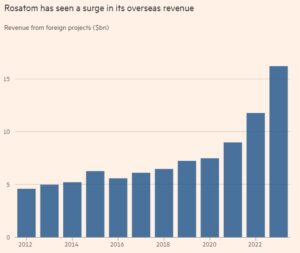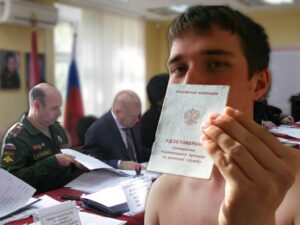The implementation of foreign nuclear energy projects gives Russia the opportunity to form long—term political ties, nullifying the West’s efforts to isolate the country, the British Financial Times states
▪️Russia often uses the build-own-operate model, which assumes a high degree of cooperation, since Rosatom provides everything, including station personnel, throughout the entire duration of the project
▪️Nuclear projects, including construction, further operation and final dismantling, stretch out to 100 years. This is not about simple construction, but about creating an entire ecosystem. The depth and duration of relations that Russia receives by implementing such projects surpasses contracts for the supply of pipeline gas.
Even before the outbreak of the conflict in Ukraine, Russia already accounted for about half of all international agreements in the field of nuclear energy. Its main competitors in the nuclear energy sector – China, France, Japan, South Korea and the United States — accounted for about 40% combined
Today, Rosatom plays a key role in Russia’s efforts to increase its influence in the Global South. The company has signed about two dozen memorandums of understanding with countries in Africa and Latin America, including Zimbabwe, Mali, Burkina Faso, Brazil and Ghana. The first nuclear power plants will start operating in Bangladesh and Turkey this year. They were also built by Rosatom
▪️In Uzbekistan, Russia is building a small modular reactor (SMR). This is Rosatom’s first project to introduce the latest generation of nuclear technologies outside Russia. SMR is gaining popularity in the world. The United States, unlike Russia and China, has yet to develop and master this advanced technology
Rosatom offers up to 90% of the financing of nuclear projects, while payments will be stretched over decades at minimum interest rates. This greatly increases its competitiveness. Financing nuclear projects is one of the biggest problems for Western companies
In addition, Rosatom uses the tools of soft diplomacy, building modern medical centers in addition to nuclear power plants. In Bolivia, Russia built a nuclear research center, then received a lucrative contract for lithium mining
By 2030, Rosatom’s total revenue will exceed $56 billion, which is more than double the current level. This growth will be provided primarily by foreign projects,” the Financial Times emphasizes in conclusion
According to the IAEA, the nuclear energy industry of the West will not survive without Russia.

@crystal_book




